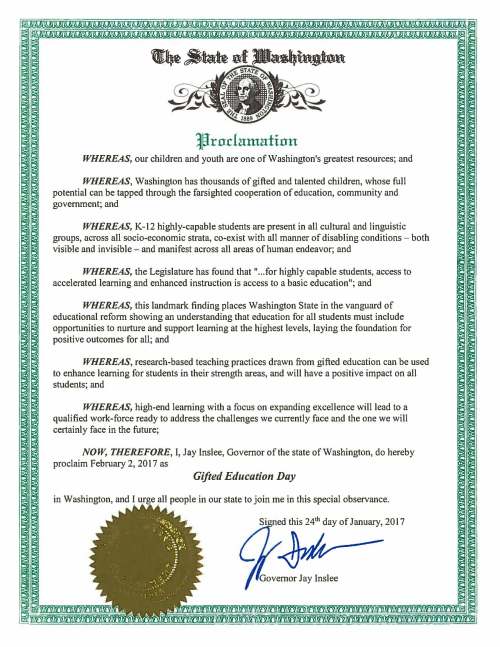We have an exciting day of advocacy scheduled for Thursday, February 2nd.
Our program begins at 10am in the Columbia Room.
Our morning events will include Gayle Pauley, Assistant Superintendent for Special Programs and Federal Accountability, and Jody Hess, Highly Capable Program Supervisor from OSPI, to talk about the amazing collaborations going on right now to bring groundbreaking professional development opportunities to educators across the state. Their work will have immediate impacts on the way highly capable learners are identified.
We’ll also hear from Camille Jones, Washington State’s 2017 Teacher of the Year, about the highly capable students she teaches in the Quincy School District, students who have historically been underrepresented in gifted programs.
Rounding off our featured speakers is René Islas, Executive Director of the National Association of Gifted Children. NAGC has recently launched a Giftedness Knows No Boundaries campaign that is a perfect match with our work in Washington State.
We expect many attendees will have capitol tours or meetings scheduled with legislators. We will leave ample time between our morning and afternoon events for you to explore and advocate.
At 1:30pm, action will move to the Senate Early Learning and K-12 Education Committee where there will be a work session on highly capable. We expect our portion of the hearing to begin at about 2pm. Pauley, Jones, and Islas will have 30 minutes to inform and answer questions from the members of the Committee to help them better understand the needs of highly capable learners.
Reminder: parking is limited on the campus so consider parking in one of the satellite lots and using DASH. Parking on both the campus and satellites can be expensive so come prepared. If you use DASH, there is a convenient stop right outside the door nearest the Columbia Room.
Can’t join us in Olympia on February 2nd?
The Washington State Constitution states: “It is the paramount duty of the state to make ample provision for the education of all children residing within its borders.” It also requires that the system be uniform across the state and funded through regular and dependable sources. in 2007 The McCleary lawsuit was brought forward against the state for its failure to fulfill its paramount duty, and the State Supreme Court ruled in 2012 in favor of the plaintiffs, finding that the state was not meeting its educational obligation to the more than 1 million public school children in Washington.
A central issue in the court’s McCleary decision is the unconstitutional reliance on local levies, which are neither regular nor dependable, to fund basic education. As advocates for the highly capable students of Washington, we are working for full funding of the Highly Capable Program. The Legislature must pass a plan by the end of this session to comply with the State Supreme Court’s order.
Senate Republicans have offered one plan, SB 5607. House Democrats have just released their plan, HB 1843. Our initial readings of each plan finds that each falls short of ample funding for highly capable services. Each relies on an old, insufficient, and somewhat arbitrary formula for establishing eligibility for highly capable funding. We recommend the state follow the recommendations of the 2010 Highly Capable Program Technical Work Group and fund highly capable services for 5% of a district’s enrolled population, an amount close to historical levels of students served in Washington, and one that aligns with the recommendations of the National Association for Gifted Children.
If you can’t join us in Olympia for Gifted Education Day, contact your legislators by letter, phone — the hot line is 1.800.562.6000 — or email on or about February 2nd and urge them to fund highly capable services at 5% of enrollment.
Share your personal experience as a parent or your child’s experience. Your personal story on the impact of funding inequities is a powerful way to highlight the need for a solution.
To find and contact your Legislators, use the District Finder on the Legislature’s website.
Read Full Post »




